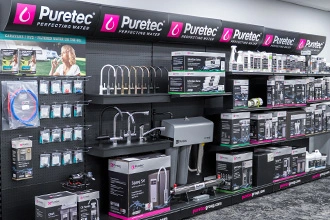Puretec Know Your Water - Rainwater
Check out the contaminants commonly found in rainwater. Discover how Puretec's filtration solutions make your rainwater safe for consumption.

Check out the contaminants commonly found in rainwater. Discover how Puretec's filtration solutions make your rainwater safe for consumption.


Rainwater collection is great practice. It’s free from the sky, it tastes great, it’s reasonably consistent in terms of quality and there generally aren’t many things that need to be treated before it’s ready for drinking or using throughout your home.
Sediment
One of the first issues we come across with rainwater is sediment. Sediment is inevitably going to end up in your rainwater tank and then throughout your plumbing and appliances. Dirt and dust will blow onto your roof and wash into your tank. Other things like leaves and debris from trees will enter your rainwater through gutters and of course, faecal matter often enters rainwater tanks due to bird and animal droppings being washed in from the catchment area. So, while a filtration system on the outside of the house is a good idea, it is not a substitute for keeping your gutters and tanks clean.
Bacteria
Bacteria is the next thing that should be considered. As we mentioned, birds and animals often live in or travel across roofs. These animals carry with them some bacteria that can be harmful to our health. There’s no guarantee that drinking rainwater is going to be harmful to your health, but there certainly are some bacteria that are common enough to cause concern as far as drinking water goes.
Low pH
Another thing that could be considered, is that the pH levels of rainwater are generally quite low, which can potentially cause corrosion to any metals in your home that it comes in contact with. When rainwater falls from the sky, it picks up carbon dioxide and it forms something called carbonic acid. When carbonic acid reaches your plumbing system, it may be combined with low hardness in the water and create very corrosive water. Copper is quite susceptible to corrosion from low pH. Sometime you may even see enough corrosion that there could be a blue/green stain around taps or shower heads.
Other Issues
Some of the other things you may experience with rainwater are overspray from agriculture nearby, deposits from fumes from vehicle all the things we’ve mentioned are treatable at the point of entry or the point of use. Something you might like to do is look into just what the quality of your rainwater is like. One way to do this is to get a water analysis. This is a fairly straightforward process which can usually be done with a very basic water test. So, now that you understand a little bit more about rainwater and it’s potential problems, you may wish to speak to an expert. The Puretec team is happy to discuss your circumstances and what is the right fit for you and your family, simply give us a call or browse our website for more information.

Puretec is the preferred water filtration supplier among the plumbing, building and irrigation stores. To find out more about product stock, we recommend calling your chosen store prior to visiting.